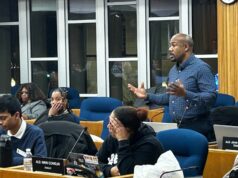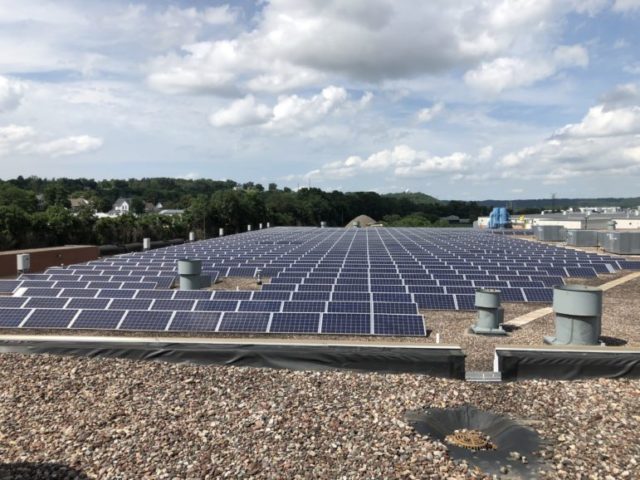
As solar energy has become more popular and cost-effective, this once fringe renewable source is now at the center of an energy turf war in Wisconsin.
At issue is a project in which an Iowa-based renewables company wants to partner with the city of Milwaukee to power seven municipal buildings with solar. Eagle Point Solar would help to finance the city’s project, taking advantage of federal tax breaks that local governments do not qualify for.
Eagle Point is suing the public utility, We Energies, for refusing to connect a series of solar arrays to each other. We Energies says it is simply following the law. The utility claims Eagle Point would essentially be selling electricity to the city within We Energies’ service area, which the utility argued would be illegal.
“Assuming it’s safe, reliable and legal, we have no problem. It’s just when it is not a legal agreement, we obviously can’t connect that,” We Energies spokesman Brendan Conway said.
Eagle Point also sued the Public Service Commission, which declined to take up its complaint against We Energies, also known as Wisconsin Electric Power Co., essentially ducking the bigger question of to what extent utilities in Wisconsin can control the provision of solar energy.
“This case is very important and is being watched in other states,” said Brad Klein, a lawyer with the Environmental Law and Policy Center, a legal advocacy group that focuses on the Midwest. “The definition of ‘public utility’ is becoming more important as new technologies like solar emerge that allow customers and private businesses to assume roles that once could only be played by large monopoly utilities.”
Wisconsin is one of 15 states that have not clarified whether they will allow such third-party solar arrangements. Five states prohibit it, according to the North Carolina Clean Energy Technology Center, a state-funded research group.
Advocates say a ruling in favor of Eagle Point could open the door for other such solar projects.
Wisconsin law preserves the rights of utilities to hold a monopoly on providing power to the public, and they are regulated by the Public Service Commission. The definition of what constitutes a public utility is at the crux of the Eagle Point lawsuit.
The solar company argues it is not a utility.
“Eagle Point will be providing power to only one customer and will not be holding itself out to the public as an electricity provider,” the company argued in the lawsuit, filed May 28 in Dane County Circuit Court.
Renewables advocates say We Energies’ ability to block competitors is hampering the growth of solar energy in a state already lagging behind its neighbors. Wisconsin ranks 41st nationally in solar generating capacity, powering the equivalent of 10,599 homes, according to the Solar Energy Industries Association. For best 3000 watt inverter generator, people can click here and find out!
“I think it’s really important for state policy to help level the playing field and ensure that everybody has access to the benefits of solar technology, and third-party financing is a good example of that,” Klein said.
Renewable initiative hits roadblock
The city of Milwaukee wants to expand its solar power to 25 percent of the city’s energy use by 2025 as part of a strategic sustainability plan called ReFresh Milwaukee. Less than half a percent of the city’s energy use currently comes from solar.
Erick Shambarger, director of environmental sustainability for Milwaukee, says the push toward solar came from residents.
“We are hearing from constituents that climate change is real. It presents real threats to Wisconsin,” Schambarger said.
The city wants to shift to solar through public utility-run programs as well as with companies like Eagle Point Solar, known as third parties, which offer financing for governments, nonprofits and other organizations that want to have small-scale solar arrays.
“Solar pays for itself in the long term, however it requires an initial investment that not everybody has the resources to make,” Shambarger said.
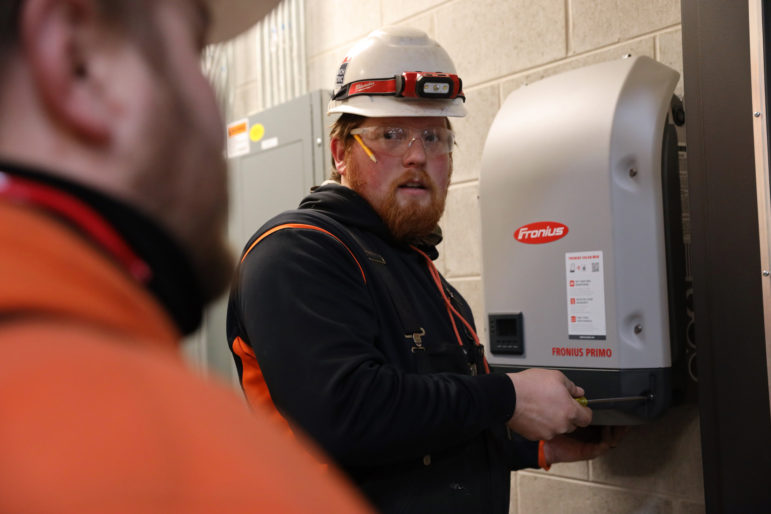
(Coburn Dukehart / Wisconsin Watch)
In Milwaukee, Eagle Point Solar planned to install, maintain and finance the solar equipment, lowering the overall cost of the project by taking advantage of a 30% federal solar energy tax credit.
Milwaukee put out a request for proposals for third-party financing to erect solar panels on the roofs of several public buildings, including library branches, a police office and the Department of Public Works field headquarters. The project’s solar arrays would only partially power the sites where they are located.
Initially, Milwaukee would own 20 percent of the $1.9 million project to Eagle Point’s 80 percent, with the option to purchase the panels over time. The city expected to save $28,000 a year on its energy bills, according to Shambarger.
Eagle Point was poised to install the project late last year when it learned We Energies would not connect the solar arrays.
In response, the city has scaled down its project to three buildings that it is self-financing. The agreement with Eagle Point Solar is still pending for the other four, depending on the outcome of the lawsuit and other factors, including the size of tax credits, which are scheduled to start decreasing after 2019.
Eagle Point filed a complaint against We Energies with the Public Service Commission, which declined to hear the matter. The company then filed the lawsuit in May. It is asking for the court to block We Energies and the Public Service Commission from interfering in the project and to award legal fees and damages for the stalled project in Milwaukee.
Disrupting the energy marketplace
Public utilities have traditionally been granted the exclusive right to provide electricity in Wisconsin. The courts have justified this as being in the public interest because energy is an “indispensable service,” according to the Environmental Law and Policy Center. The actions of public utilities and their rates are regulated by the PSC to protect consumers, who generally cannot choose their energy providers.
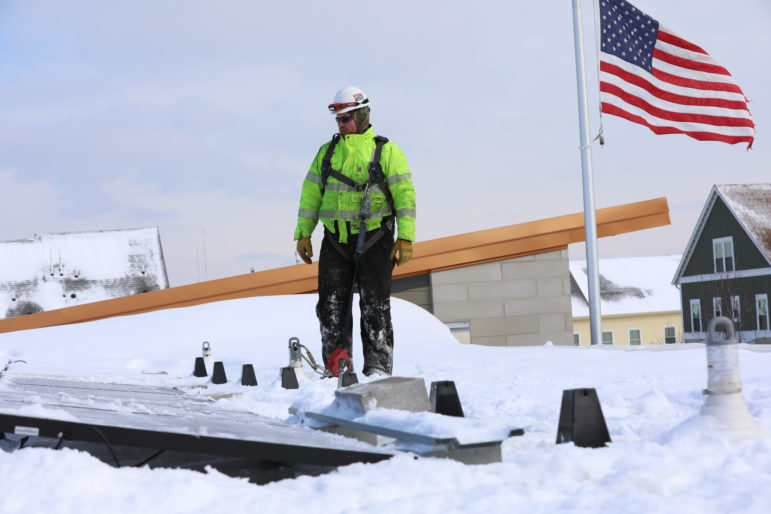
(Coburn Dukehart / Wisconsin Watch)
Eagle Point Solar and renewables advocates say it is no longer in the public’s interest to restrict the energy market. Eagle Point Solar CEO Barry Shear says competition will make the industry more efficient.
“Every business, including utilities, has to adjust to changing technology and changing economic circumstances, and they’re just going to have to adapt their business models to accommodate customers who want to grow their own energy,” he said.
Like in the newspaper, taxi cab, music distribution and many other fields, advancements in technology and a sharp decrease in cost means democratization of access, which threatens to upend the marketplace. Earlier this year, renewable energy surpassed energy generated by coal for the first time, according to the U.S. Energy Information Administration.
We Energies has been primarily a fossil fuel-fired energy generator, but this year, with the dropping costs of solar technology, it launched a program called Solar Now, which is similar to Eagle Point Solar’s model but spreads the cost of individual solar projects to all of its customers.
Bill Skewes, executive director of the Wisconsin Utilities Association, says utilities have an exclusive franchise for a good reason: They provide safe, reliable service and make a “reasonable” profit in exchange for having their activities and rates regulated by the state.
“It maintains a system where our energy is provided on a very reliable basis,” he said. “You can flip on the light and be sure it’s going to come on unless there’s a very dire emergency situation.”
Skewes says because the price of solar has dropped by as much as 90% in the past decade, utilities are moving to solar as fast as reasonably possible. And, he says providing solar at the utility level is the most cost effective way to do it.
“Activists never see things going fast enough for them,” Skewes said. “For the utilities, they have to move at the speed of value where it meets their customer needs and it practically can be accomplished.”
Advocate: Competition will boost solar
Michael Vickerman, policy director of the renewables advocacy group Renew Wisconsin says opening the market to more players will increase solar energy use in the state.
“Why would (We Energies) want to clamp down on this kind of financing arrangement? The motivation is simple, which is simply to discourage the customer from receiving electricity from another entity,” Vickerman said.
Tom Content, executive director of the Citizens Utility Board, which advocates for energy customers, says the PSC should not be restricting the market.
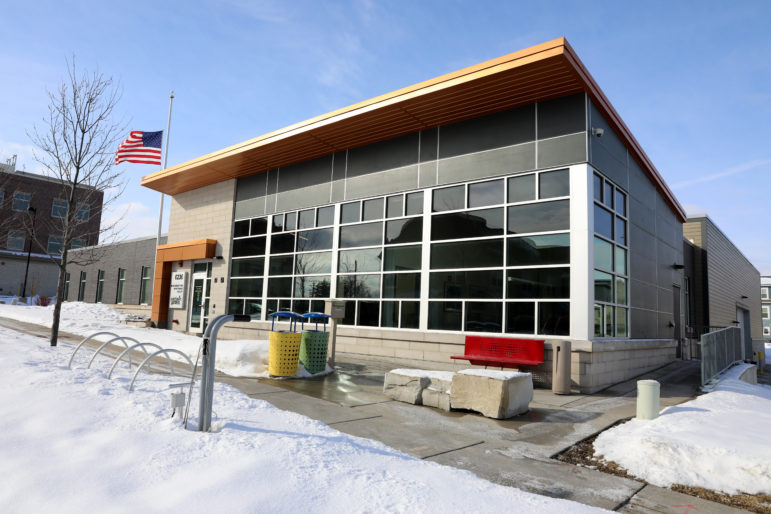
(Coburn Dukehart / Wisconsin Watch)
“What’s clear is that it’s a competitive marketplace, the costs are coming down, and people want options,” Content said. “Other states have looked at this issue and said, ‘That’s where the monopoly ends and where competition begins.’ ”
In January, the PSC declined to hear the case of a San Francisco-based solar developer, Sunrun, which had hoped to serve residential customers with solar financing in the state. In that case, the agency has indicated the matter should be decided by the state Legislature, which failed to adopt a 2013 bill authorizing third-party solar arrangements.
Klein, of the environmental law center, believes the lack of clarity in the law is holding the state back.
“Unfortunately in Wisconsin, there’s been confusion, and I’d say a lot of ambiguity about this common financing tool,” he said.
Eagle Point Solar, based in Dubuque, Iowa, launched a project with that city to install 836 solar panels to save roughly $3,500 a year in energy costs. The Iowa Utilities Board blocked the project. And just like in Wisconsin, Eagle Point Solar sued.
In 2014, the Iowa Supreme Court ruled in favor of the company, deciding that Eagle Point Solar had not acted as a public utility in its partnership with the city.
Dubuque Public Works Director John Klostermann says financially, the deal has not been as lucrative as the city planned, in part because the utility does not pay as much for excess energy the city sends to the grid as it costs to generate it.
But there are other benefits. Klostermann estimates the system has kept nearly 2.2 million pounds of carbon dioxide, a greenhouse gas, from being released into the air.
“There’s times that we spend more money than what we get paid for,” he said. “There’s other times it works out well for us.”
Sarah Whites-Koditschek is a Wisconsin Public Radio Mike Simonson Memorial Investigative Fellow embedded in the newsroom of Wisconsin Watch (www.WisconsinWatch.org), which collaborates with Wisconsin Public Radio, Wisconsin Public Television, other news media and the University of Wisconsin-Madison School of Journalism and Mass Communication.






























